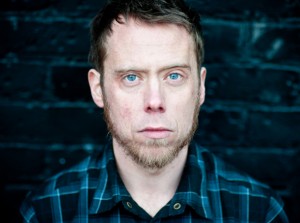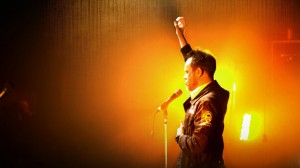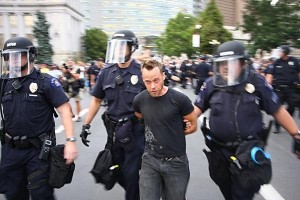By Melanie Rainone
Jared Paul is a poetic and musical powerhouse that calls Providence home. As a nationally acclaimed spoken word poet and hip-hop artist, he draws his inspiration from social injustices and fuses his two art forms together to create something unique and powerful.
 Jared’s upbringing and early introduction to hip-hop took him on a journey that introduced him to poetry, community action, and national activism. He has become a radical and artistic voice of Providence, bringing the culture of poetry, working with the youth and community at large with a little rabble rousing thrown in.
Jared’s upbringing and early introduction to hip-hop took him on a journey that introduced him to poetry, community action, and national activism. He has become a radical and artistic voice of Providence, bringing the culture of poetry, working with the youth and community at large with a little rabble rousing thrown in.
“Hip-hop is poetry. Hip-hop is the continuation of the oral tradition. It’s poetry put to music. The rhyme scheme, the meter, the metaphor, hip hop is the first music that was more about poetry than it was about music.”
Jared grew up in the Manville neighborhood of Lincoln. “I grew up below the poverty line in terms of the state’s eyes, but both of my parents loved me a tremendous amount and I had a really great childhood. We always had all of the things that we needed and most of the things that we wanted.”
Jared has fond memories of Manville, speaking of a strong community and many children his age with whom to play. “We had to see from a very young age the real time class divide.”
It was in this environment that Jared found music.“My friend Joey gave me Public Enemy at the bus stop in 7th grade and it changed everything for me,” he explained.
“They had all of these powerful songs about life, and about a lot of the same things we were going through or that our friends or family were going through. From that moment on it was our main music, and a main influence in our lives: it informed us, inspired us, picked us up when we were down, gave our anger validation.”
It is hard to tell the story of Jared without mentioning Sage Francis. Francis is a hip-hop artist and spoken word poet from Rhode Island whom Jared credits with his introduction to poetry and political action.
Jared and Sage met as students at URI, but Sage’s influence on Jared as an artist began long before the two ever became friends. The copy of Public Enemy that Jared got from his friend Joey at the busstop, the album that Jared says started it all, had been given to Joey by his older brother, who had gotten it from Sage Francis.
“He was my friend, but he was also kind of like a superhero: he was an amazing performer, his writing was better than anyone we knew, he was a black belt in karate, he had a kickass hip-hop show on [URI’s radio station, WRIU] 90.3FM, he had a full beard, and could easily beat up a grown man.”
It was Sage that brought Jared to his first poetry reading at URI. “All these teenagers relatively sober with informed opinions on politics, music, life. Reading poems and songs about love, loss, struggle, the military, sex, poetry, culture. Everything. I didn’t know anything like that existed … I had the opposite of a nervous breakdown, I had a nervous awakening.”
 Jared became involved in the Providence slam poetry scene in 1998. It took him three years to make the team, but the year he did coincided with the National Poetry Slam being hosted in Providence. He was a part of Team Providence for the next seven years. During that time, Providence made it to the semi-finals at Nationals five times, and Jared made it to finals stage at the Individual World Poetry Slam in 2006 and again in 2007.
Jared became involved in the Providence slam poetry scene in 1998. It took him three years to make the team, but the year he did coincided with the National Poetry Slam being hosted in Providence. He was a part of Team Providence for the next seven years. During that time, Providence made it to the semi-finals at Nationals five times, and Jared made it to finals stage at the Individual World Poetry Slam in 2006 and again in 2007.
But Jared sensed that an outlet for adults was not enough. In 2002, Jared made a proposal to the Providence Slam staff to start a youth poetry slam. “I knew that youth of Prov were hungry for it, and the movement was growing around the country,” said Jared. He coached and directed the Providence Youth Slam until 2009, during which time they made it to the finals stage three times and were featured on HBO’s series Brave New Voices. “Team Providence became one of the most respected youth slam teams and communities in the country and folks gave us a lot of love,” Jared said. “Coaching and working with the youth, was easily one of the best experiences of my life.”
Jared’s work with Rhode Island youth extended beyond poetry. “I wanted to work somewhere in the overall movement for social justice,” he said. A friend of his was a group home counselor and referred Jared to a non-profit. “They recruited me for a specialized program working with teen sex offenders and sex crime survivors,” he said. “It was the hardest, most eye opening, educational, enraging, and spiritually damaging work I’ve ever done.” He worked there for four years until he began touring full time.
 For anyone familiar with Jared’s work, it is fueled by passion about social injustice. He does work as an environmental, animal, and human rights activist, causes that are the main subject matter for his poetry and music. His poem entitled “Conspiracy to Riot: 2008 RNC Arrest Story Pt. 1” tells the story of Jared’s arrest for felony riot at the Republican National Convention in 2008. This was not the first time Jared found himself in trouble with the law, after being part of the mass arrest that happened during the 2004 RNC. This past January, it was announced that New York City agreed to pay nearly $18 million for the arrest, detention, and fingerprinting of hundreds, making it the largest protest settlement in history.
For anyone familiar with Jared’s work, it is fueled by passion about social injustice. He does work as an environmental, animal, and human rights activist, causes that are the main subject matter for his poetry and music. His poem entitled “Conspiracy to Riot: 2008 RNC Arrest Story Pt. 1” tells the story of Jared’s arrest for felony riot at the Republican National Convention in 2008. This was not the first time Jared found himself in trouble with the law, after being part of the mass arrest that happened during the 2004 RNC. This past January, it was announced that New York City agreed to pay nearly $18 million for the arrest, detention, and fingerprinting of hundreds, making it the largest protest settlement in history.
After all of his national recognition and success, the question remains: why Providence? “For such a tiny city we have a crazy arts and music scene, and a super strong counter culture,” he said. “There are protests every week, there’s an organized radical labor contingent, one of the strongest, most tenured poetry communities in the country.” Jared currently lives in Providence as a part of the AS220 Artists in Residence program, describing AS220 as an internationally recognized beacon of hope.
“The time I set aside for direct action goes to picketing with hotel workers in my neighborhood at the Renaissance and the Hilton as they fight for fair wages and better working conditions.” He also volunteers with the Providence Poetry Slam and participates in protests and hearings organized by Occupy providence and the Olneyville Neighborhood Association.
Aside from his activism work here in Rhode Island, Jared is working on various upcoming poetry and music projects. “Right now I’m working on my book and a brand new album, so my focus is there,” he said. Jared’s first book (title to be determined) is due to be released in the spring of 2015. He describes it as a collection of poetry, autobiographical short stories, and personal essays about traveling, protesting, and social justice organizing.


